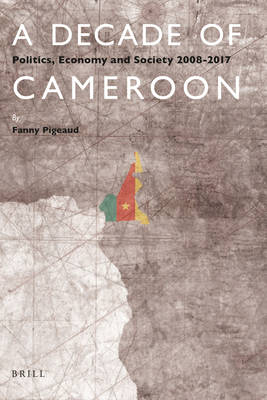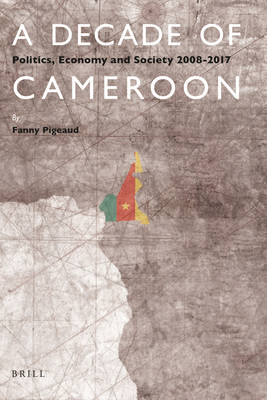
Je cadeautjes zeker op tijd in huis hebben voor de feestdagen? Kom langs in onze winkels en vind het perfecte geschenk!
- Afhalen na 1 uur in een winkel met voorraad
- Gratis thuislevering in België vanaf € 30
- Ruim aanbod met 7 miljoen producten
Je cadeautjes zeker op tijd in huis hebben voor de feestdagen? Kom langs in onze winkels en vind het perfecte geschenk!
- Afhalen na 1 uur in een winkel met voorraad
- Gratis thuislevering in België vanaf € 30
- Ruim aanbod met 7 miljoen producten
Zoeken
€ 41,45
+ 82 punten
Omschrijving
This ten-year review of Cameroon's economic, social and political events covers a delicate period in the recent history of this Central African country, rich in natural and human resources. It begins with a difficult year: 2008 was marked by serious socio-political unrest linked to the wish of President Paul Biya, in power since 1982, to change the constitution, by removing the limitation on the number of presidential terms. Once the constitution was amended, the president was re-elected in 2011 for seven years. But in a predictable way and while the economy was stagnating, the political situation slowly deteriorated in the following years, leading in 2017 to the beginning of a civil war in one part of the country. This decade allows us to see a locked political system, inherited from colonization, but which seems more and more at the end of the race.
Cette revue de dix ans de l'actualité économique, sociale et politique du Cameroun couvre une période délicate de l'histoire récente de ce pays d'Afrique centrale, riche en ressources naturelles et humaines. Elle commence par une année difficile: 2008 a été marquée par des troubles sociopolitiques graves liés à la volonté du président Paul Biya, au pouvoir depuis 1982, de changer la constitution, afin de supprimer la limitation du nombre de mandats présidentiels. Une fois la constitution modifiée, le président a pu être réélu en 2011 pour sept ans. Mais de manière prévisible et alors que l'économie stagnait, la situation politique s'est lentement dégradée au cours des années suivantes, jusqu'à déboucher en 2017 sur un début de guerre civile dans une partie du pays. A travers ces dix ans se dessine ainsi un système politique verrouillé, hérité de la colonisation, mais qui semble de plus en plus en fin de course.
Cette revue de dix ans de l'actualité économique, sociale et politique du Cameroun couvre une période délicate de l'histoire récente de ce pays d'Afrique centrale, riche en ressources naturelles et humaines. Elle commence par une année difficile: 2008 a été marquée par des troubles sociopolitiques graves liés à la volonté du président Paul Biya, au pouvoir depuis 1982, de changer la constitution, afin de supprimer la limitation du nombre de mandats présidentiels. Une fois la constitution modifiée, le président a pu être réélu en 2011 pour sept ans. Mais de manière prévisible et alors que l'économie stagnait, la situation politique s'est lentement dégradée au cours des années suivantes, jusqu'à déboucher en 2017 sur un début de guerre civile dans une partie du pays. A travers ces dix ans se dessine ainsi un système politique verrouillé, hérité de la colonisation, mais qui semble de plus en plus en fin de course.
Specificaties
Betrokkenen
- Auteur(s):
- Uitgeverij:
Inhoud
- Aantal bladzijden:
- 134
- Taal:
- Engels
Eigenschappen
- Productcode (EAN):
- 9789004395251
- Verschijningsdatum:
- 18/04/2019
- Uitvoering:
- Paperback
- Formaat:
- Trade paperback (VS)
- Afmetingen:
- 124 mm x 188 mm
- Gewicht:
- 136 g

Alleen bij Standaard Boekhandel
+ 82 punten op je klantenkaart van Standaard Boekhandel
Beoordelingen
We publiceren alleen reviews die voldoen aan de voorwaarden voor reviews. Bekijk onze voorwaarden voor reviews.









